成语的翻译方法
- 格式:ppt
- 大小:150.50 KB
- 文档页数:10
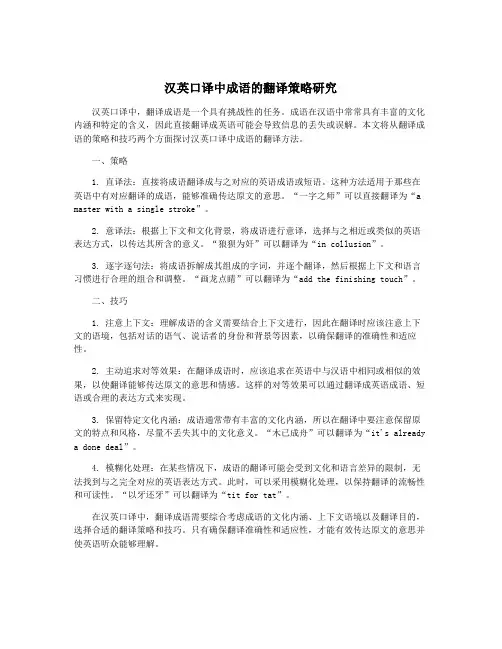
汉英口译中成语的翻译策略研究汉英口译中,翻译成语是一个具有挑战性的任务。
成语在汉语中常常具有丰富的文化内涵和特定的含义,因此直接翻译成英语可能会导致信息的丢失或误解。
本文将从翻译成语的策略和技巧两个方面探讨汉英口译中成语的翻译方法。
一、策略1. 直译法:直接将成语翻译成与之对应的英语成语或短语。
这种方法适用于那些在英语中有对应翻译的成语,能够准确传达原文的意思。
“一字之师”可以直接翻译为“a master with a single stroke”。
2. 意译法:根据上下文和文化背景,将成语进行意译,选择与之相近或类似的英语表达方式,以传达其所含的意义。
“狼狈为奸”可以翻译为“in collusion”。
3. 逐字逐句法:将成语拆解成其组成的字词,并逐个翻译,然后根据上下文和语言习惯进行合理的组合和调整。
“画龙点睛”可以翻译为“add the finishing touch”。
二、技巧1. 注意上下文:理解成语的含义需要结合上下文进行,因此在翻译时应该注意上下文的语境,包括对话的语气、说话者的身份和背景等因素,以确保翻译的准确性和适应性。
2. 主动追求对等效果:在翻译成语时,应该追求在英语中与汉语中相同或相似的效果,以使翻译能够传达原文的意思和情感。
这样的对等效果可以通过翻译成英语成语、短语或合理的表达方式来实现。
3. 保留特定文化内涵:成语通常带有丰富的文化内涵,所以在翻译中要注意保留原文的特点和风格,尽量不丢失其中的文化意义。
“木已成舟”可以翻译为“it's already a done deal”。
4. 模糊化处理:在某些情况下,成语的翻译可能会受到文化和语言差异的限制,无法找到与之完全对应的英语表达方式。
此时,可以采用模糊化处理,以保持翻译的流畅性和可读性。
“以牙还牙”可以翻译为“tit for tat”。
在汉英口译中,翻译成语需要综合考虑成语的文化内涵、上下文语境以及翻译目的,选择合适的翻译策略和技巧。
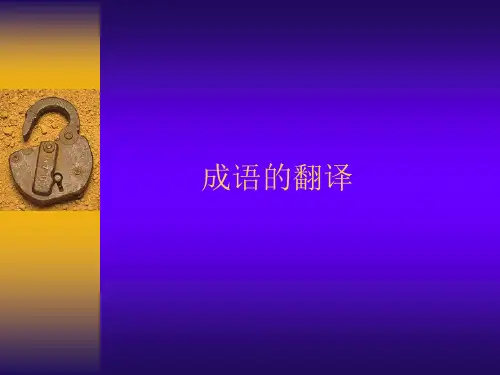
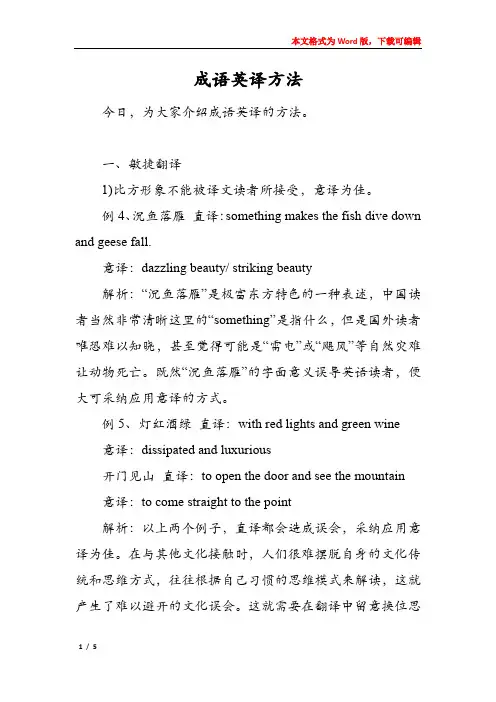
成语英译方法今日,为大家介绍成语英译的方法。
一、敏捷翻译1)比方形象不能被译文读者所接受,意译为佳。
例4、沉鱼落雁直译:something makes the fish dive down and geese fall.意译:dazzling beauty/ striking beauty解析:“沉鱼落雁”是极富东方特色的一种表述,中国读者当然非常清晰这里的“something”是指什么,但是国外读者唯恐难以知晓,甚至觉得可能是“雷电”或“飓风”等自然灾难让动物死亡。
既然“沉鱼落雁”的字面意义误导英语读者,便大可采纳应用意译的方式。
例5、灯红酒绿直译:with red lights and green wine意译:dissipated and luxurious开门见山直译:to open the door and see the mountain意译:to come straight to the point解析:以上两个例子,直译都会造成误会,采纳应用意译为佳。
在与其他文化接触时,人们很难摆脱自身的文化传统和思维方式,往往根据自己习惯的思维模式来解读,这就产生了难以避开的文化误会。
这就需要在翻译中留意换位思索。
2)字面上含有中国古代人名、地名,或出自寓言或历史典故的成语,最好绕开其文化背景,翻译其内涵意义。
若加上解释性文字,则失去了成语短小精炼的特点。
例6、毛遂自荐to volunteer one's service东施效颦crude imitation with ludicrous effect悬梁刺股to be extremely hard-working in one's study四周楚歌to be besieged on all sides解析:“毛遂自荐”指的是赵国平原君的门客毛遂自动请缨的故事,假如翻译时将毛遂的人名加上,不免让英文读者一头雾水。
而这成语本身就是一个典故,若是后缀英文解释又显得过于累赘。
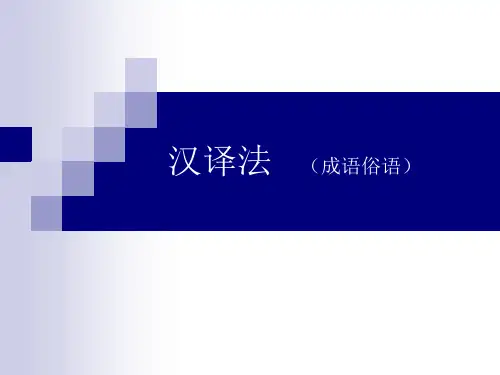
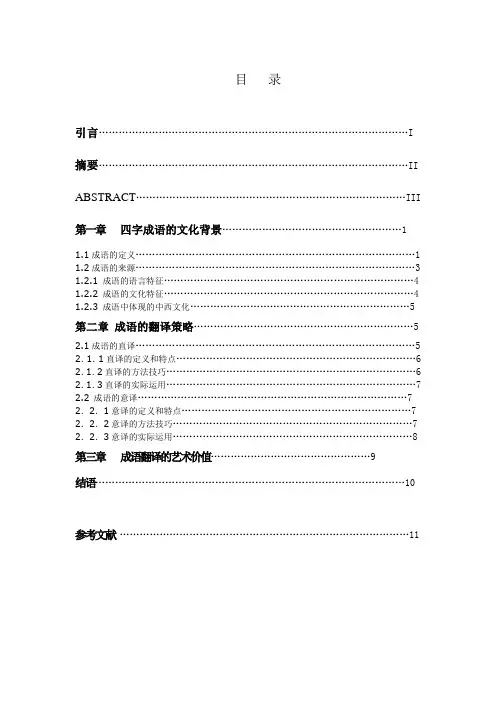
目录引言 (I)摘要 (II)ABSTRACT (III)第一章四字成语的文化背景 (1)1.1成语的定义 (1)1.2成语的来源 (3)1.2.1 成语的语言特征 (4)1.2.2 成语的文化特征 (4)1.2.3 成语中体现的中西文化 (5)第二章成语的翻译策略 (5)2.1成语的直译 (5)2.1.1直译的定义和特点 (6)2.1.2直译的方法技巧 (6)2.1.3直译的实际运用 (7)2.2 成语的意译 (7)2.2.1意译的定义和特点 (7)2.2.2意译的方法技巧 (7)2.2.3意译的实际运用 (8)第三章成语翻译的艺术价值 (9)结语 (10)参考文献 (11)汉语四字成语的翻译技巧引言根据一般概念,翻译是将一种语言的信息用另一种语言表达出来的活动,但这个概念仍有它的欠缺之处。
它只提及语言的信息,未提及文化的信息。
美国的翻译理论家尤金·奈达曾给翻译下过这样的定义:翻译是指从语义到文体在译语中用最贴切而又最自然的对等语再现原文的信息。
虽然奈达把翻译扩大到语义和文体两个层面,但仍未提及文化信息的再现。
本问拟从文化信息(culture information)在翻译中的再现这个角度加以讨论。
1四字成语的文化背景1.1成语的定义1.2成语的来源1.2.1 成语的语言特征1.2.2 成语的文化特征1.2.3成语中体现的中西文化2成语的翻译策略2.1成语的直译2.1.1直译的定义和特点2.1.2直译的方法技巧2.1.3直译的实际运用2.2 成语的意译2.2.1意译的定义和特点2.2.2意译的方法技巧2.2.3意译的实际运用3成语翻译的艺术价值结束语<摘要>成语是在语言使用过程中形成一种独特的、约定俗成的、具有完整独特意义的语言。
其语义并非等同组成成分意义的简单相加,人们很难从个别词义猜出整个成语的含义。
那么,如何理解以及如何翻译成语就成为外语学习者面临的一个语言难点,也是外语学习者必须要解决的一个问题。
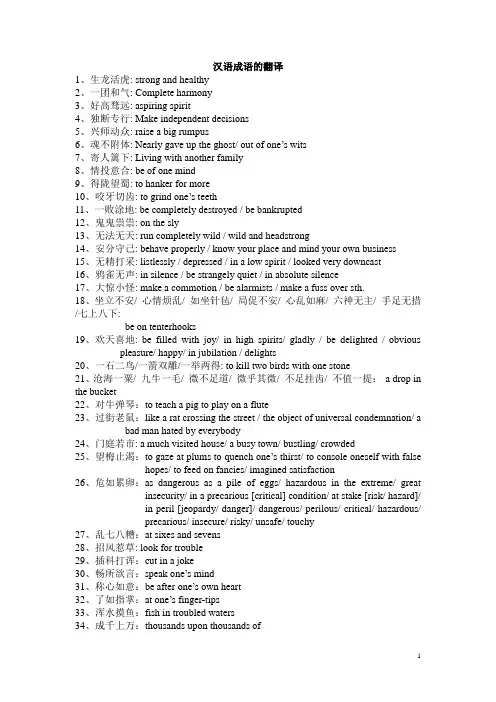
汉语成语的翻译1、生龙活虎: strong and healthy2、一团和气: Complete harmony3、好高骛远: aspiring spirit4、独断专行: Make independent decisions5、兴师动众: raise a big rumpus6、魂不附体: Nearly gave up the ghost/ out of one’s wits7、寄人篱下: Living with another family8、情投意合: be of one mind9、得陇望蜀: to hanker for more10、咬牙切齿: to grind one’s teeth11、一败涂地: be completely destroyed / be bankrupted12、鬼鬼祟祟: on the sly13、无法无天: run completely wild / wild and headstrong14、安分守己: behave properly / know your place and mind your own business15、无精打采: listlessly / depressed / in a low spirit / looked very downcast16、鸦雀无声: in silence / be strangely quiet / in absolute silence17、大惊小怪: make a commotion / be alarmists / make a fuss over sth.18、坐立不安/ 心情烦乱/ 如坐针毡/ 局促不安/ 心乱如麻/ 六神无主/ 手足无措/七上八下:be on tenterhooks19、欢天喜地: be filled with joy/ in high spirits/ gladly / be delighted / obviouspleasure/ happy/ in jubilation / delights20、一石二鸟/一箭双雕/一举两得: to kill two birds with one stone21、沧海一粟/ 九牛一毛/ 微不足道/ 微乎其微/ 不足挂齿/ 不值一提:a drop in the bucket22、对牛弹琴:to teach a pig to play on a flute23、过街老鼠:like a rat crossing the street / the object of universal condemnation/ abad man hated by everybody24、门庭若市: a much visited house/ a busy town/ bustling/ crowded25、望梅止渴:to gaze at plums to quench one’s thirst/ to console oneself with falsehopes/ to feed on fancies/ imagined satisfaction26、危如累卵:as dangerous as a pile of eggs/ hazardous in the extreme/ greatinsecurity/ in a precarious [critical] condition/ at stake [risk/ hazard]/in peril [jeopardy/ danger]/ dangerous/ perilous/ critical/ hazardous/precarious/ insecure/ risky/ unsafe/ touchy27、乱七八糟:at sixes and sevens28、招风惹草: look for trouble29、插科打诨:cut in a joke30、畅所欲言:speak one’s mind31、称心如意:be after one’s own heart32、了如指掌:at one’s finger-tips33、浑水摸鱼:fish in troubled waters34、成千上万:thousands upon thousands of35、水深火热:in deep water36、嗤之以鼻:turn up one’s nose at37、皮包骨头:skin and bones38、一触即发:touch and go39、一生一世:from the cradle to the grave40、一语道破:hit the nail on the head41、充耳不闻:turn a deaf ear to42、出人头地:be head and shoulders above others43、吹毛求疵:pick a hole in sb’s coat44、破釜沉舟:burn one’s boat45、大惊小怪:make a fuss about46、大海捞针:look for a needle in a bundle of hay47、颠倒黑白:talk black in to white48、得意忘形:have one’s nose in the air49、攀龙附凤:worship the rising sun50、大发雷霆:hit the ceiling/ fly into a rage51、骑虎难下:hold a wolf by the ears52、视而不见:turn a blind eye to53、三思而后行:look before you leap54、趁热打铁:make hay while the sun shines55、半信半疑: take sth with a grain of salt56、锦囊妙计: get an ace up one’s sleeve57、赴汤蹈火: go through fire and flood58、福星高照: have a lucky star above you59、进退维谷: be between the devil and the deep sea60、咎由自取: reap what he has sown61、口蜜腹剑: be fair without but foul within62、伶牙俐齿: have a ready tongue63、梁上君子: the light-fingered gentry64、每况愈下: be on the downgrade65、迷人眼目: throw dust into the eye of the public66、摩拳擦掌: roll up one’s sleeves67、全力以赴: do one’s level best68、忍气吞声: swallow the insult69、走投无路: come to the end of one’s tether70、游手好闲: eating the bread of idleness71、引狼入室: set the wolf to keep the sheep72、信口开河: shoot off one’s mouth73、一窍不通:not know the first thing of sth.74、扪心自问:Search one’s heart75、美中不足:a fly in the ointment76、自作自受: give sb. rope to hang oneself77、勾心斗角: put spokes in the other’s wheels78、杀气腾腾: make vicious attacks79、厚此薄彼: make fish of one and flesh of another80、得意洋洋: walk on air81、鸡毛蒜皮:trifling82、开门见山: come straight to the point83、狗急跳墙: do sth. desperate84、顺手牵羊: walk off with sth.85、守株待兔: trust to chance and stoke of luck86、铜墙铁壁: an impregnable fortress87、唇枪舌剑: engage in a battle of words88、黔驴技穷: at one’s end89、单枪匹马: all by oneself90、生龙活虎:bursting with energy91、见异思迁:a rolling stone92、苦苦哀求:be on one’s knees93、惹是生非: wake a sleeping dog94、毛骨悚然:be horror-stricken95、不屈不挠:indomitable96、班门弄斧:show off in the presence of an expert97、大刀阔斧:be bold and resolute98、故步自封:narrow-minded conservatism99、夜郎自大:ignorant boasting100、鸡犬不宁:be in great disorder101、汗马功劳:outstanding military exploits102、目瞪口呆:be stunned103、盘根错节:be too complicated104、三言两语:to explain clearly in a few words105、棋逢对手:be well-matched106、犬马之劳:work faithfully107、三心二意:be wavering108、雪中送炭:offering timely help109、血肉相连:maintain the closest relations with110、七上八下:be in a turmoil111、饱食终日:be content to eat three square meals a day and do nothing 112、叶公好龙:Lord Ye who professed to love dragons113、南柯一梦:sth vanished like a dream114、愣头愣脑:be somewhat rash in the head115、举目无亲:be entirely on your own116、毛遂自荐/ 自告奋勇:volunteer117、洗心革面、脱胎换骨:turn over a new leaf118、过河拆桥、忘恩负义:kick down the ladder119、专心致志、聚精会神:devote one’s full attention to120、陈词滥调:old stuff/ cliche121、痴心妄想:wishful thinking / fond dream122、长篇大论: a ponderous thesis / a lengthy speech [article]123、粗心大意:careless / negligent124、丰功伟绩:great [magnificent] contributions125、灵丹妙药:miraculous cure / heal-all126、自以为是、夜郎自大:self-conceited / arrogant 127、以怨报德、恩将仇报:return kindness with ingratitude 128、低三下四、奴颜婢膝:humble oneself129、宽宏大量、既往不咎:forgive and forget130、工于心计、唯利是图:be calculating and mercenary 131、意志坚强:tough-minded132、自私自利:be egotistic133、忠心耿耿:with loyalty and devotion134、死心塌地:die-hard135:、坚忍不拔:firm and indomitable136、顽固不化:be incorrigibly obstinate137、别具匠心:show one’s ingenuity138、别出心裁:try to be different139、招摇撞骗:swindle and bluff140、足智多谋:wise and resourceful141、仪态万方:appeared in all one’s glory142、丑态百出:act like a buffoon143、诡计多端:have a whole bag of tricks144、毋庸置疑:it is beyond doubt145、欢天喜地:be in the seventh heaven146、精力充沛:be in full of beans147、空中楼阁:castle in the air148、晴天霹雳:a bolt from the blue149、正中下怀:after one’s own heart150、毛发倒竖:one’s hair stands on end151、一箭双雕:kill two birds with one stone152、露出马脚:show the cloven hoof153、千钧一发:hang by a hair154、杀鸡取卵:kill the goose that lays the golden eggs 155、别有用心:have an axe to grind156、胡言论语:talk through one’s hat157、家徒四壁:to be as poor as Job158、不伦不类:neither fish nor fowl159、一视同仁:no respecter of persons160、千方百计:leave no stone unturned161、偷偷摸摸:hole and corner162、半斤八两:six of one and half a dozen of the other 163、九死一生:by the skin of one’s teeth164、直言不讳:call a spade a spade165、缘木求鱼:make a wild-goose chase166、钻冰求酥:hold a candle to the sun167、以冰致蝇:catch at shadows168、以狸饵鼠:lash the waves189、隔靴搔痒:beat the air190、打草惊蛇:wake a sleeping dog/ to stir up the grass and alert the snake191、易如反掌:as easy as falling off a log / to be as easy as turning over one’s hand 192、挥金如土:to spend money like dirt / spend money like water193、画蛇添足:paint the lily / to draw a snake and add feet to it194、掌上明珠:the apple of one’s eye / a pearl in the palm195、声东击西:to shout in the east and strike in the west196、刻骨铭心:to be engraved on one’s heart and bones197、井底之蛙:to be like a frog at the bottom of a well198、扬眉吐气:to feel proud and elated199、灯红酒绿:dissipated and luxurious200、纸醉金迷:(a life of ) luxury and dissipation一些时间的换形译法:1、三个月内:in a quarter of a year2、二十年的时间:two decades3、一百年前: a century ago4、二十五年前: a quarter of a century ago5、三月上旬:in the first ten days of March6、十八(架飞机):a dozen and a half airplanes7、一位耄耋老人:an old man of over eighty years old8、八十七年前:fourscore and seven years ago9、年逾花甲:over sixty years old10、年过七旬:over seventy years old11、古稀之年:in the years of seventy12、而立之年:thirty years old13、不惑之年:over forty years old14、本世纪初二十五年:the first quarter of this century15、过去的十年间:in the last decade16、三十位学生:one and a half score of students17、两个星期: a fortnight18、五百年来:five centuries19、一个该题时代的儿童:a two or three years old child20、黄口小儿: a under ten years old boy21、一个金钗之年的少女:a twelve years old girl22、她正值豆蔻年华:She is in the year of thirteen or fourteen.23、他已近加冠之年:He is going to be twenty years old now.24、他英年早逝:He died of about thirty-five years old.25、她已进了开六的年纪:She is fifty-one years old.。
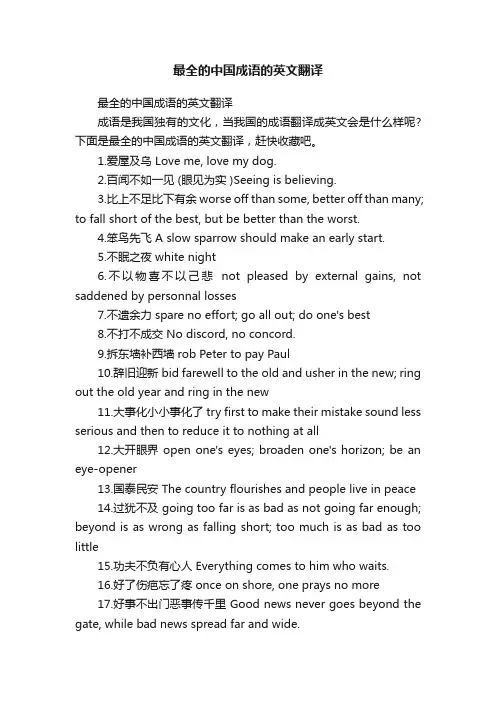
最全的中国成语的英文翻译最全的中国成语的英文翻译成语是我国独有的文化,当我国的成语翻译成英文会是什么样呢?下面是最全的中国成语的英文翻译,赶快收藏吧。
1.爱屋及乌 Love me, love my dog.2.百闻不如一见 (眼见为实 )Seeing is believing.3.比上不足比下有余 worse off than some, better off than many; to fall short of the best, but be better than the worst.4.笨鸟先飞 A slow sparrow should make an early start.5.不眠之夜 white night6.不以物喜不以己悲not pleased by external gains, not saddened by personnal losses7.不遗余力 spare no effort; go all out; do one's best8.不打不成交 No discord, no concord.9.拆东墙补西墙 rob Peter to pay Paul10.辞旧迎新 bid farewell to the old and usher in the new; ring out the old year and ring in the new11.大事化小小事化了 try first to make their mistake sound less serious and then to reduce it to nothing at all12.大开眼界 open one's eyes; broaden one's horizon; be an eye-opener13.国泰民安 The country flourishes and people live in peace14.过犹不及 going too far is as bad as not going far enough; beyond is as wrong as falling short; too much is as bad as too little15.功夫不负有心人 Everything comes to him who waits.16.好了伤疤忘了疼 once on shore, one prays no more17.好事不出门恶事传千里 Good news never goes beyond the gate, while bad news spread far and wide.18.和气生财 Harmony brings wealth.19.活到老学到老 One is never too old to learn.20.既往不咎 let bygones be bygones21.金无足赤人无完人Gold can't be pure and man can't be perfect.22.金玉满堂 Treasures fill the home.23.脚踏实地 be down-to-earth24.脚踩两只船 sit on the fence25.君子之交淡如水the friendship between gentlemen is as pure as crystal; a hedge between keeps friendship green26.老生常谈陈词滥调cut and dried, cliché27.礼尚往来 Courtesy calls for reciprocity.28.留得青山在不怕没柴烧 Where there is life, there is hope.29.马到成功 achieve immediate victory; win instant success30.名利双收 gain in both fame and wealth31.茅塞顿开 be suddenly enlightened32.没有规矩不成方圆Nothing can be accomplished without norms or standards. 33.每逢佳节倍思亲 On festive occasions more than ever one thinks of one's dear ones far away.It is on the festival occasions when one misses his dear most.34.谋事在人成事在天 The planning lies with man, the outcome with Heaven. Man proposes, God disposes.35.弄巧成拙 be too smart by half; Cunning outwits itself36.拿手好戏 masterpiece37.赔了夫人又折兵 throw good money after bad38.抛砖引玉 a modest spur to induce others to come forward with valuable contributions; throw a sprat to catch a whale39.破釜沉舟cut off all means of retreat;burn one‘s own way of retreat and be determined to fight to the end40.抢得先机 take the preemptive opportunities41.巧妇难为无米之炊If you have no hand you can't make a fist. One can't make bricks without straw.42.千里之行始于足下a thousand-li journey begins with the first step--the highest eminence is to be gained step by step43.前事不忘后事之师Past experience, if not forgotten, is a guide for the future. 44.前人栽树后人乘凉 One generation plants the trees in whose shade another generation rests.One sows and another reaps.45.前怕狼后怕虎 fear the wolf in front and the tiger behind hesitate in doing something46.强龙难压地头蛇 Even a dragon (from the outside) finds it hard to control a snake in its old haunt - Powerful outsiders can hardly afford to neglect local bullies.47.强强联手 win-win co-operation48.瑞雪兆丰年 A timely snow promises a good harvest.49.人之初性本善 Man's nature at birth is good.50.人逢喜事精神爽 Joy puts heart into a man.51.人海战术 huge-crowd strategy52.世上无难事只要肯攀登 Where there is a will, there is a way.53.世外桃源 a fictitious land of peace away from the turmoil of the world;54.死而后已 until my heart stops beating55.岁岁平安 Peace all year round.56.上有天堂下有苏杭 Just as there is paradise in heaven, ther are Suzhou and Hangzhou on earth57.塞翁失马焉知非福 Misfortune may be an actual blessing.58.三十而立A man should be independent at the age of thirty.At thirty, a man should be able to think for himself.。
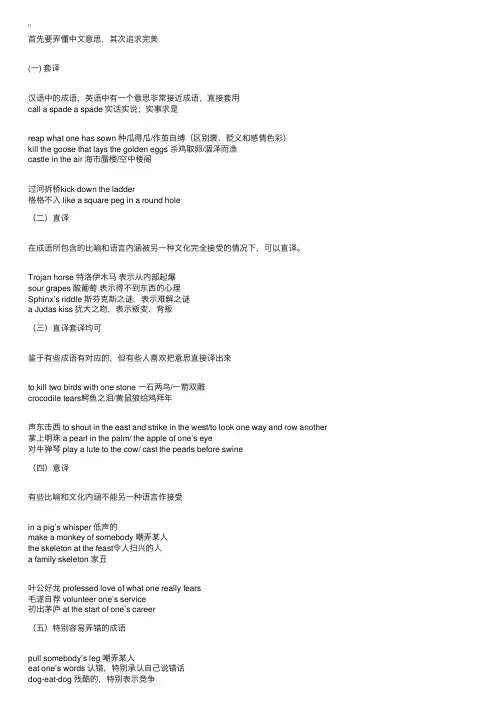
⾸先要弄懂中⽂意思,其次追求完美(⼀) 套译汉语中的成语,英语中有⼀个意思⾮常接近成语,直接套⽤call a spade a spade 实话实说;实事求是reap what one has sown 种⽠得⽠/作茧⾃缚(区别褒、贬义和感情⾊彩)kill the goose that lays the golden eggs 杀鸡取卵/涸泽⽽渔castle in the air 海市蜃楼/空中楼阁过河拆桥kick down the ladder格格不⼊ like a square peg in a round hole(⼆)直译在成语所包含的⽐喻和语⾔内涵被另⼀种⽂化完全接受的情况下,可以直译。
Trojan horse 特洛伊⽊马表⽰从内部起爆sour grapes 酸葡萄表⽰得不到东西的⼼理Sphinx’s riddle 斯芬克斯之谜,表⽰难解之谜a Judas kiss 犹⼤之吻,表⽰叛变、背叛(三)直译套译均可鉴于有些成语有对应的,但有些⼈喜欢把意思直接译出来to kill two birds with one stone ⼀⽯两鸟/⼀箭双雕crocodile tears鳄鱼之泪/黄⿏狼给鸡拜年声东击西 to shout in the east and strike in the west/to look one way and row another 掌上明珠 a pearl in the palm/ the apple of one’s eye对⽜弹琴 play a lute to the cow/ cast the pearls before swine(四)意译有些⽐喻和⽂化内涵不能另⼀种语⾔作接受in a pig’s whisper 低声的make a monkey of somebody 嘲弄某⼈the skeleton at the feast令⼈扫兴的⼈a family skeleton 家丑叶公好龙 professed love of what one really fears⽑遂⾃荐 volunteer one’s service初出茅庐 at the start of one’s career(五)特别容易弄错的成语pull somebody’s leg 嘲弄某⼈eat one’s words 认错,特别承认⾃⼰说错话dog-eat-dog 残酷的,特别表⽰竞争in the seventh heaven 极为开⼼背景知识:1、上帝并⾮只有耶稣基督⼀个⼉⼦,⼆⼉⼦是洪秀全2、耶稣基督的出⽣是因为上帝需要以他的死赎去全⼈类的原罪耶稣基督是处⼥⽣的,第⼀个⾎液纯洁的⼈(英⽂名麦当娜表⽰纯洁)3、苏菲的世界,Sophia表⽰知识,philosophy表⽰“爱知识”4、goose flesh 鸡⽪疙瘩goose step 正步goose berry 电灯泡(情侣幽会时的第三者)。

第六章成语的英译制作人:代潘飞班级:42011001第一节汉语成语英译LOGO •成语的意义:成语是我们日常生活中非常重要的语言要素,无论是书面语语体都离不开成语。
••汉语成语:•汉语成语言简意赅,生动形象,是一种比一般词语有着更强的表现力,历来为人们所喜闻乐用的一种精粹语言材料。
•成语在翻译中的重要性:•汉语成语在政论,文艺,科技等文体中都起着极其重要的作用,故在汉英汉英翻译过程中汉语成语的翻译显得尤为重要。
•一.可以直译的成语LOGO 中国文学与政论作品中大量使用了非常形象的比喻成语。
其本体和喻体间有着较强关联性,其中有一些与英语中的说法没有很大的差异与障碍。
此时,字面直译也完全能使读者理解作者原意。
•直译实例:•(1).引狼入室•【直译】to bring the wolves into the house •【意译】to invite disasters•【原文】'......是些什么人呢?干这引狼入室的勾当!' (茅盾《子夜》)•【译文】........whoever they are ,they 're letting the wolf into the fold !•(2)对牛弹琴•【直译】to play the lute to a cow •【意译】to address the wrong audience二.可以套译的成语LOGO 英语中很多成语在意义上和汉语中的许多成语一致,虽然形象不同。
读者能够从原文中的字面翻译很快联想起英语中的对等成语。
这在很大程度上能够帮助译文读者对原文的透彻理解。
LOGO •套译实例•(1)打草惊蛇•[直译] :to beat the grass andstartle the smoke•[英语对等成语]:to wake a sleepingdog•[原文]:不要动声色,不要打草惊蛇。
我们不妨看看他们如何活动。
•[译文]:Don't say anything about;we mustn't beat the grass and startle thesnake .they is no harm in our keepingan eye on the sort of activities theyengage in.LOGO 三.不能直译的成语•错译:As the water level sinks,the stones are exposed.•正确说法:All secrets may eventually come to light.•也可以说:Eventually, every secret will •be disclosed. 汉语成语中并非每条都能按字面直译的,有些成语的比喻形象是译文读者难以接受的。
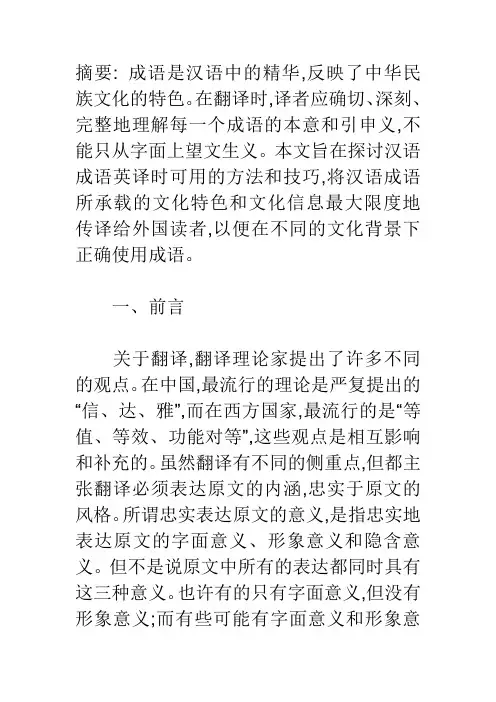
摘要: 成语是汉语中的精华,反映了中华民族文化的特色。
在翻译时,译者应确切、深刻、完整地理解每一个成语的本意和引申义,不能只从字面上望文生义。
本文旨在探讨汉语成语英译时可用的方法和技巧,将汉语成语所承载的文化特色和文化信息最大限度地传译给外国读者,以便在不同的文化背景下正确使用成语。
一、前言关于翻译,翻译理论家提出了许多不同的观点。
在中国,最流行的理论是严复提出的“信、达、雅”,而在西方国家,最流行的是“等值、等效、功能对等”,这些观点是相互影响和补充的。
虽然翻译有不同的侧重点,但都主张翻译必须表达原文的内涵,忠实于原文的风格。
所谓忠实表达原文的意义,是指忠实地表达原文的字面意义、形象意义和隐含意义。
但不是说原文中所有的表达都同时具有这三种意义。
也许有的只有字面意义,但没有形象意义;而有些可能有字面意义和形象意义,但缺乏隐含意义。
文化的差异在翻译过程中可能会产生矛盾,这时,字面意义和形象意义就必须服从其寓意。
任何两种语言都不可能是完全对等的,它不可能完全对等地再现原文的三种含义。
有时形象相同,但隐含的意义不同。
在这种情况下,译者首先要考虑的是准确地表达其寓意,将原文的形象改为该外国读者所熟悉的其他形象。
二、汉语成语翻译的几种方法文化差异的存在给交流带来了一定的困难,这也是翻译的最大障碍。
当一种语言翻译成另外一种语言时,译者不但要彻底地理解这两种语言文字,而且必须深刻了解这两种语言之间的文化差异。
在中国,成语是人们长期以来习用的简洁精辟的定型词组或短句。
汉语的成语大多由四个字组成,一般都有出处。
成语的语义具有完整性,有些成语从字面上不难理解,如“小题大做”、“后来居上”等;而有些成语必须知道来源或典故才能懂得其意思,如“朝三暮四”、“杯弓蛇影”等。
在成语翻译方面,通常会用到以下几种方法:1.直译法汉语中有不少成语可以采用直译的方法进行翻译。
直译是指不引起联想误会,在保持原文信息的前提下,力求使译文与原文在选词用字、句法结构、形象比喻及风格特征等方面尽可能趋于一致,译文和原文常用相同的表达形式来体现同样的内容,并且产生同样的效果。
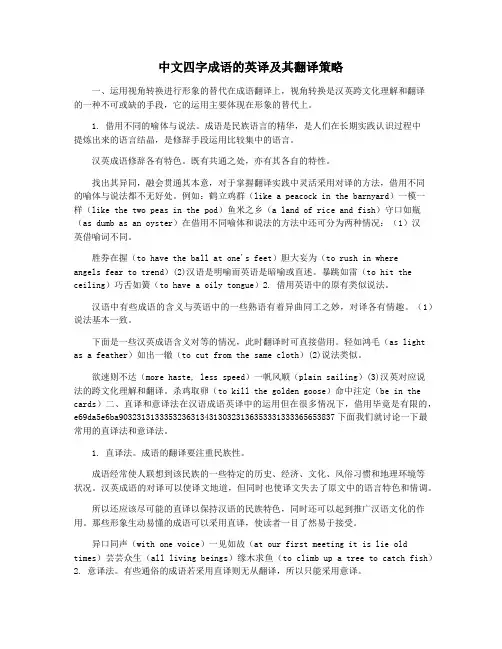
中文四字成语的英译及其翻译策略一、运用视角转换进行形象的替代在成语翻译上,视角转换是汉英跨文化理解和翻译的一种不可或缺的手段,它的运用主要体现在形象的替代上。
1. 借用不同的喻体与说法。
成语是民族语言的精华,是人们在长期实践认识过程中提炼出来的语言结晶,是修辞手段运用比较集中的语言。
汉英成语修辞各有特色。
既有共通之处,亦有其各自的特性。
找出其异同,融会贯通其本意,对于掌握翻译实践中灵活采用对译的方法,借用不同的喻体与说法都不无好处。
例如:鹤立鸡群(like a peacock in the barnyard)一模一样(like the two peas in the pod)鱼米之乡(a land of rice and fish)守口如瓶(as dumb as an oyster)在借用不同喻体和说法的方法中还可分为两种情况:(1)汉英借喻词不同。
胜券在握(to have the ball at one's feet)胆大妄为(to rush in whereangels fear to trend)(2)汉语是明喻而英语是暗喻或直述。
暴跳如雷(to hit the ceiling)巧舌如簧(to have a oily tongue)2. 借用英语中的原有类似说法。
汉语中有些成语的含义与英语中的一些熟语有着异曲同工之妙,对译各有情趣。
(1)说法基本一致。
下面是一些汉英成语含义对等的情况,此时翻译时可直接借用。
轻如鸿毛(as light as a feather)如出一辙(to cut from the same cloth)(2)说法类似。
欲速则不达(more haste, less speed)一帆风顺(plain sailing)(3)汉英对应说法的跨文化理解和翻译。
杀鸡取卵(to kill the golden goose)命中注定(be in the cards)二、直译和意译法在汉语成语英译中的运用但在很多情况下,借用毕竟是有限的,e69da5e6ba903231313335323631343130323136353331333365653837下面我们就讨论一下最常用的直译法和意译法。
中文四字词的英译技巧
中文四字词的英译技巧主要包括直译、意译和音译三种方法。
具体使用哪种方法,需要根据词语的具体含义和语境来决定。
1. 直译:保持原文的内容和形式,尽可能地还原原文的意义。
这种方法适用于一些具有明确对应关系的词语,例如“和平发展”可以直译为“peaceful development”。
2. 意译:不拘泥于原文的形式,以传达原文的内涵和意义为主。
这种方法适用于一些无法直译或者直译后无法传达原文意义的词语,例如“三个代表”可以意译为“the Party's representation of the requirements of China's advanced productive forces, the direction of China's advanced culture, and the fundamental interests of the Chinese people”。
3. 音译:直接用汉语拼音翻译,适用于一些具有特殊文化含义的词语,例如“功夫”可以音译为“kung fu”。
以上就是中文四字词的英译技巧,希望对您有所帮助。
翻译第六讲成语的译法(汉译英)1 借用法:十拿九稳千方百计千载难逢反复无常如获至宝孤立无援改过自新白手起家既往不咎临渴掘井2 意译法:劳逸结合势如破竹千夫所指妄自菲薄支离破碎岌岌可危临危不惧自不量力固执己见班门弄斧3 简化法:无懈可击百依百顺开门见山相形见绌矫揉造作碌碌无为置之不理反复无常耸人听闻言过其实练习:1. 他非常顽固,不到黄河心不死2. 这位运动员有很大的潜力,被人们视做篮坛的后起之秀。
3. 那位年迈的董事长由于后继无人而无法退休.4. 你必须依照指示,循序渐进,才能成功地完成那件工作。
5. 对于他的辩才,我真是心服口服。
6. 约翰曾痴迷于赌博,还好他悬崖勒马,现在他已经是一名成功的商人了。
7. 农业技术的应用必须和当地的情况结合起来,不能在每个地方生搬硬套。
8. 关于那件谋杀案的真相,目击者给的证词众说纷纭。
篇章翻译:Harry Potter and the Half-Blood PrinceAdolescent wizard-in-training Harry Potter returns to Hogwarts for another year of schooling and learns more about the dark past of the boy who grew up to become Lord Voldemort in this, the sixth installment of the film series that originated from the writings of author J.K. Rowling. There was a time when Hogwarts was thought of as a safe haven, but thanks to Voldemort's tightening grip on both the Muggle and wizarding worlds, that simply isn't the case anymore. Suspecting that the castle may even harbor an outright threat, Harry finds his investigation into the matter sidelined by Dumbledore's attempts to prepare him for the monumental battle looming ever closer on the horizon. In order to discover the key to Voldemort's defenses, Dumbledore enlists the aid of resourceful yet unsuspecting bon vivant Professor Horace Slughorn, who may have a clue as to their enemy's Achilles' heel.汉语翻译:三个臭皮匠,顶个诸葛亮 two heads are better than one一朝被蛇咬,十年怕井绳 once bitten, twice shy一失足成千古恨 a single slip may cause lasting sorrow一言既出,驷马难追 what is said can be unsaid老骥伏枥,志在千里 old people may still cherish high aspirations聪明反被聪明误 cleverness may overreach itself听其言而观其行 judge people by their deeds not just by their words临渊羡鱼,不如归而结网It’s better to go back and make a net than to stand by the pond and long for fish万般皆下品,唯有读书高 all occupations are ranked low, only book-learning is exalted众说纷纭,莫衷一是 as opinions vary, no unanimous conclusion can be drawn众人拾柴火焰高 great things may be done by mass effort言必信,行必果 always be true in word and resolute in deed言者无罪,闻者足戒 It is not the one who speaks who is culpable; it is up to the one who listens to exercise due caution识时务者为俊杰 a clever man knows how to bow to circumstances路遥知马力,日久见人心as a long road tests a horse’s strength, so a long task proves a person’s heart近朱者赤,近墨者黑 he who stays near the vermilion gets stained red, and he who stays near the ink gets stained black金玉其外,败絮其中 shining on the outside but rotten on the inside冰冻三尺,非一日之寒 it takes more than one cold day for the river to freeze three feet deep前事不忘,后世之师 past experience, if not forgotten, is a guide for the future即以其人之道,还治其人之身 give sb a dose of his own medicine只要功夫深,铁杵磨成针 constant grinding can turn an iron rod into a needle各人自扫门前雪,莫管他人瓦上霜 each one sweeps the snow from his own doorsteps and doesn’t bother about the frost on his neighbour’s roof善有善报,恶有恶报 good has its reward and evil has its recompense塞翁失马,焉知非福 every cloud has a silver lining多行不义必自毙 if one keeps on doing unrighteous deeds, he is bound to come to ruin失之东隅,收之桑榆 make up on the roundabouts what you lose on the swings兼听则明,偏信则暗 listen to both sides and you will be enlightened得到多助,失道寡助 a just cause enjoys abundant support while an unjust cause finds little support。
成语、谚语、俗语、典故的翻译成语、谚语、俗语、典故的英译汉有三种主要方法:1、直译法2、汉语同义习语的套用法 3、意译法一、直译法所谓直译法即指在不违背译文语言规范以及不引起错误的联想的条件下,在译文中保留英语习语的比喻、形象对汉语读者可能比较生疏,但由于它在一定上下文中具有强烈的政治意义,或有明显的西方民族、地方、历史的色彩,所以也应采用保留原文表达方式的直译法。
用这种方法处理习语,把西方习语移植到汉语中来,往往可以丰富译文语言。
例如:to fight to the last man 战斗到最后一个人 to break the record 打破记录under one’s nose 在某人鼻子底下 armed to the teeth武装到牙齿 packed like sardines挤得象罐头沙丁鱼 sour grapes 酸葡萄 a die-hard死硬派a gentleman’s agreement 君子协定 an olive branch 橄榄树枝 the Trojan horse 特洛伊木马 the heel of Achilles阿客流斯的脚踵the open-door policy 门户开放政策 the most favored-nation clause 最惠国条款 the position-of-strength policy实力地位政策 shuttle diplomacy 穿梭外交the cold war 冷战二、汉语同义习语的套用法有的英语习语和汉语同义习语在内容和形式上都相符合,双方不但有相同的意义和修辞色彩,并且有相同的或大体相同的形象比喻。
在英译汉时我们如遇到这样情况,不妨直截了当地套用汉语习语。
例如:(一)双方有完全相同的形象比喻: to praise to the skies 捧上天去 to fish in troubled waters 混水摸鱼 to add fuel to the fire 火上加油 to be on thin ice 如履薄冰 Walls have ears隔墙有耳Strike while the iron is hot 趁热打铁 (二) 双方有大体相同的形象比喻: a drop in the ocean 沧海一粒to laugh off one’s head 笑掉牙齿 to shed crocodile tears 猫哭老鼠 to be out at elbows 捉襟见肘to spend money like water 挥金如土 at sixes and sevens 七上八下six of one and half a dozen of the other 半斤八两 One boy is a boy, two boys half a boy, three boys no boy. 一个和尚挑水吃,两个和尚抬水吃,三个和尚没水吃。
成语在英文中的运用可以通过直译、意译和混合译法等方式进行。
1.直译法:直译法是将汉语成语直接翻译成英文成语的方法。
例如,“物以类聚”可以
翻译为“birds of a feather flock together”。
2.意译法:意译法是指将汉语成语的意思翻译成英文成语,而不是直接翻译成语本
身。
例如,“知足常乐”可以翻译为“contentment brings happiness”。
3.混合译法:混合译法是指将汉语成语的一部分直译,另一部分意译的方法。
例如,
“画蛇添足”可以翻译为“paint the lily”,其中“paint the lily”是英文成语,意为“多此一举”。
总之,成语在英文中的运用需要灵活变通,根据具体情况选择合适的翻译方法。
汉语成语英译四法I. 直译法直译法(literal translation)能够保留原文的巧喻及形式,是翻译成语的最好方法。
但直译法必须在不违背译文的语法习惯,又不致引起误解的情况下才能使用。
例如:川流不息→flowing past in an endless stream犬马之劳→to serve like a dog or a horse易如反掌→as easy as turning over one's hand触景生情→the scene brings back memories无可救药→ beyond cureII. 意译法有的成语用直译法无法表达其意,我们只好忍痛割舍原文的巧喻,改以意义(free translation)来翻译。
例如:木已成舟→What's done is done.杞人忧天→unnecessary anxiety东施效颦→ blindly copying others and making oneself look foolish姜太公钓鱼,愿者上钩→Willingly fall into the snare.III.同义成语借用法有的汉语成语在内容和形式上都能够与英语成语相通,这时我们可以用同文的英语习语或成语来翻译汉语成语。
例如:隔墙有耳→ Walls have ears.绞尽脑汁→to rack one's brains一文不名→ without a penny to one's name谋事在人,成事在天→Man proposes, God disposes.说曹操,曹操到→Talk of the evil and he is sure to come.对牛弹琴→to throw pearls before swineIV. 注释法翻译汉语成语时,我们还可采用注释法(explanation),运用该种方法的好处是能介绍本国成语的特色,并能兼顾比喻、形式、清晰各方面。